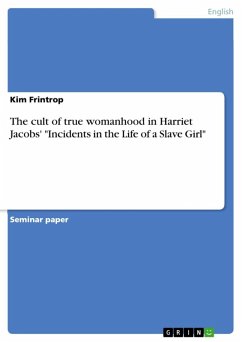Research Paper (undergraduate) from the year 2015 in the subject American Studies - Literature, grade: 2,3, Catholic University Eichstätt-Ingolstadt, course: Literary and Cultural History I: Literature of Enslavement and Freedom, language: English, abstract: Incidents in the "Life of a Slave Girl" is far more than just a slave narrative - it is a feminist document. In this autobiography, the importance of family ties is well expressed, showing that Jacobs alias Linda, does everything to not only protect her children, but also to maintain the relationships towards her brother William, her aunt Nancy, her uncles Benjamin and Phillip and especially her grandmother. Published in the 19th century, women were not yet as emancipated as they are today. The whole model of femininity was different. During the Victorian time, the image of womanhood was represented by the four female virtues: piety, purity, submissiveness and domesticity. The domestic sphere of slaves truly got destroyed by not only the masters, but also by the either active cruelty of white women, or at least their passivity. Like I said in the beginning, Incidents in the Life of a Slave Girl is not just a bare narrative, but an appeal to white women, encouraging them to stand up against slavery, against their passivity and to stop watching - but to start to change this attitude. Jacobs tries to show that slavery is a pure perversity, leading to the end of the 'black race'. However as it might mean the end of the slaves, it also means the end of the white population for the mistresses and their daughters. She denounces the social system with its betrayal of the social ideals and the misused paternalistic system for abuse and exploitation. This way she shows that the picture of the benevolent family of the southern states, just like the "southern belle" is a myth only; a myth and a picture made for the external world. "Incidents in the Life of a Slave Girl" is different from the well-known plantation novels, showing a whole different picture of the southern states' women. In this paper I am going to point out how Jacobs presents the model of femininity of the black, as well as the white women and how Jacobs's picture might differ from the myth of the southern belle.
Dieser Download kann aus rechtlichen Gründen nur mit Rechnungsadresse in A, B, BG, CY, CZ, D, DK, EW, E, FIN, F, GR, HR, H, IRL, I, LT, L, LR, M, NL, PL, P, R, S, SLO, SK ausgeliefert werden.









